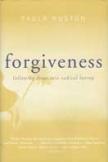Loves Beginning
Many authors have addressed the tricky subject of forgiveness. The 2007 book Amish Grace: How Forgiveness Transcended Tragedy offered a particularly insightful account of how the Amish forgave the gunman who shot 10 schoolgirls in Nickel Mines, Pa. Now Paula Huston has written a worthy addition to this genre in her new book, which describes her long struggle coming to terms with forgiveness.
As a teenager Huston volunteered at a clinic in the mountains of Honduras, where she lost her Christian faith because she could not understand why God did not intervene to help a dying baby in her care. Her doubts “soon hardened into a cynical agnosticism” that lasted nearly 20 years.
She married at age 19, but divorced 13 years later to marry another man she had fallen in love with. Eventually Huston returned to her Christian roots, this time as a Roman Catholic. She believes that one of Jesus’ “most mind-boggling declarations” is that those “who hope to follow him must first be willing to forgive the people who have hurt us.” In a nuanced discussion of what forgiveness entails, she says that first of all it does not mean that “evil be overlooked, explained away, or excused.” Moreover, it recognizes the common humanity of all people, regardless of their misdeeds or crimes. Original sin “suggests that, given the right combination of circumstances, we are all capable of unspeakable deeds.”
Forgiveness involves letting go of vengeance, anger and hatred directed at the wrongdoer, who must still be held accountable in court for any crimes committed.
In the first third of the book Huston often veers away from the main theme, but the text comes alive when she begins to relate forgiveness to her own life story. She writes frankly of her own shortcomings—reminiscent of Henri Nouwen’s writing. She recalls a time in her late 30s when she dreamed of killing someone who was spreading malicious lies about her. The dream shocked her because “this level of killing anger did not fit into my view of myself.”
Huston also candidly describes how her blind ambition to become a famous writer interfered with her spiritual development. When a publisher rejected her second novel, she felt “persecuted.” Her misguided forgiveness prayer asked God to show her tormentors their errors.
Only gradually did Huston recognize that love was a precondition to forgiveness. If we do not first love our “neighbors,” we will not forgive them.
In three insightful chapters the author applies forgiveness to parents, marriage partners and communities. She encourages readers to view their parents “as vulnerable children themselves” and to understand how their parents were shaped by family history.
Regarding her divorce, for years Huston played the role of victim, but in time realized she was “98 percent” responsible for the breakup of her marriage, which followed her extramarital love affair. She eventually apologized to her ex-husband, who told her he already had forgiven her.
She encourages couples to pray for each other because “it’s impossible to keep hating a person we are sincerely praying for.” Mutual forgiveness, she says, may be the single most important factor in saving marriages.
As a Benedictine oblate, Huston was distressed at the infighting within her small community, but learned that she had to stop brooding over wounds and realize that “we may literally have to forgive the same person for the same annoying trait over and over and over again until we’re ready to scream…and then forgive him or her again.”
Citing Jesus’ words on the cross, “Father, forgive them, they know not what they do,” Huston says it is hard to imagine a “more eloquent demonstration of the central role forgiveness is meant to play in Christian living.” Forgiveness, she notes, does not always require reconciliation. Someone who was abused or mistreated need not seek a restored relationship with the abuser and thereby risk additional mistreatment.
Huston could have made the additional point that forgiveness does not need to take place in person, a prospect that might be too painful or frightening. There are many ways to express forgiveness, like journal writing or through the mail, without a face-to-face encounter.
Although “hostility, strife and bloodshed” plague humanity, Huston writes, these horrors pale in comparison to what a world without forgiveness would be like. “We truly cannot imagine life without the possibility of forgiveness and reconciliation, for unrestrained animosity would have brought the human species to a bloody end long ago.”
This article also appeared in print, under the headline “Loves Beginning,” in the May 11, 2009, issue.







